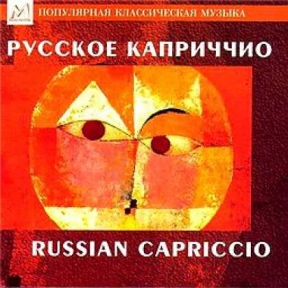RUSSIAN CAPRICCIO CDMAN 178
Label: Bomba-Piter, Gallery of Classical Music, 2005.
Weight: 90 г.
Short description: Jewel box.
Capriccio - is an Italian word, but it is easy to understand what it means. As practice shows, not only spoilt girls like to be capricious. Public in general get used to do it. And musicians are the best to soothe it.
As a genre Capriccio came to Russia from Europe, exactly from Italy. But, in spite of its foreign birth Russian composers had assimilated it brilliantly. Today's public - in a way a "granddaughter" of the XIXth century indulges itself with an orchestra Capriccios by Glinka, Tchaikovsky, Rimsky-Korsakov, and Rubinstein. Russian classics were inspired by Italian and Spain themes, hence all compositions are penetrated with South spirit, and it could be seen in every bar and, even in the titles of capriccios. Only Rubinstein preferred a truly Russian capriccio, (that's its both title and essence) to Neapolitan's songs. This composition is outstanding, it is more lyric and vast scale, special Russian heartedness and temperament, as hot as Spanish, but closer to Russian mentality.
As far as the form of capriccio is free (just as a feature of genre), sudden dramaturgic turns, rhythmic changes, condition changes and improvisation moments makes this music so powerful. Orchestral tutti and tender melodic parts shades each other and turn one ecstatic soul into a great delight.
Burning, hot music of the South strikes fire from the strings, winds out from brass and wood bells, stuns with its brilliance and satisfies the most esthetic caprices of the most refine amateur of music.
ArtiShock
Mikhail Glinka.
1. Brilliant Capriccio On The Theme Of Jota Aragonesa.
Anton Rubinstein.
2. Russian Capriccio For Piano And Orchestra, Op. 102.
Pyotr Tchaikovsky.
3. Italian Capriccio, Op.45.
Nikolay Rimsky-Korsakov.
4. Spanish Capriccio, Op.34. Alborada.
5. Spanish Capriccio, Op.34. Variazioni.
6. Spanish Capriccio, Op.34. Alborada.
7. Spanish Capriccio, Op.34. Scena e canto gitano.
8. Spanish Capriccio, Op.34. Fandango asturiano.
Igor Lebedev, piano (2)
The Peterhoff orchestra, conductor Leo Korkhin.
Recorded by Petersburg Recording Studio, 1995.


